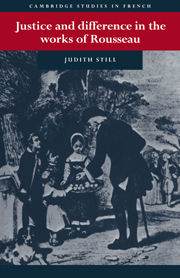Book contents
- Frontmatter
- Contents
- Acknowledgements
- A preliminary note on vocabulary and conventions
- Introduction
- Chapter 1 The problem: the intersection of beneficence and pudicity
- Chapter 2 The code of beneficence
- Chapter 3 The practice of beneficence and model benefactors in the major works
- Chapter 4 The passion of pity in Rousseau's theory of man
- Chapter 5 Gyges' ring: a reading of Rousseau's 6e Promenade
- Chapter 6 Pudicity in some of Rousseau's minor writings: its relationship to beneficence
- Conclusion
- Appendix: Generosity and pudicity in Gyges und sein Ring and Le Roi Candaule
- Notes
- Bibliography
- Index
- Cambridge Studies in French
Chapter 1 - The problem: the intersection of beneficence and pudicity
Published online by Cambridge University Press: 22 September 2009
- Frontmatter
- Contents
- Acknowledgements
- A preliminary note on vocabulary and conventions
- Introduction
- Chapter 1 The problem: the intersection of beneficence and pudicity
- Chapter 2 The code of beneficence
- Chapter 3 The practice of beneficence and model benefactors in the major works
- Chapter 4 The passion of pity in Rousseau's theory of man
- Chapter 5 Gyges' ring: a reading of Rousseau's 6e Promenade
- Chapter 6 Pudicity in some of Rousseau's minor writings: its relationship to beneficence
- Conclusion
- Appendix: Generosity and pudicity in Gyges und sein Ring and Le Roi Candaule
- Notes
- Bibliography
- Index
- Cambridge Studies in French
Summary
This book seeks to draw together two apparently separate areas of interest in the works of Rousseau: beneficence and pudicity. These two social codes are points of reference for Rousseau in this analyses of relations between unequals, respectively relations between men and relations between men and women. The thorny question of inequality is one to which Rousseau constantly returns in all his works. In Du contrat social he seeks to define the principles which would underpin a just state – a state in which inequality between men would be reduced to a minimal level, getting as close as possible to the vestigial inequality of the hypothetical state of nature which Rousseau imagines in Le Discours sur l'inégalité. In most of Rousseau's other works inequality is a fact of social existence, and he devotes considerable energy both to analysing the evils of extremes of inequality and to suggesting how inequality could be attenuated in interpersonal relations.
In this book I argue that Rousseau's thinking on inequality is to a large degree unified, but breaks down on one point, that of sexual difference. The consistent thrust of Rousseau's work is to reduce inequality because it is the root of moral and political evil – that is to say, both bad relations between individuals and bad relations between individuals and the state. However, he insists that there should be a rigid demarcation between men's and women's roles of a kind which has traditionally implied a hierarchy.
Information
- Type
- Chapter
- Information
- Justice and Difference in the Works of RousseauBienfaisance and Pudeur, pp. 5 - 15Publisher: Cambridge University PressPrint publication year: 1993
